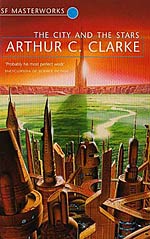
![]() Sable Aradia
Sable Aradia
6/28/2019
![]()
Read for the Science Fiction Masterworks Book Club.
This is one of the great classics of science fiction by one of the Triumvirate (the others, of course, being Isaac Asimov and Robert A. Heinlein.) In a city in the far future, the human race has achieved immortality of a sort. Their personalities and memories are stored in a massive computer database, and reloaded into bodies which are also created by computer when their bodies die. However, this city is (they believe) the only one left on a dying earth, where the oceans are long gone and the moon has been destroyed because it was going to crash into the earth. And not all humans are "alive" at any one time, because, of course, they are limited to a single city. Artificial realities are created to entertain the humans in the city, and nobody really wants anything more... except occasionally, a "Unique" is born who has no previous life or memories. We follow one of those Uniques, Alvin, as he grows to adulthood and then makes escaping the city and finding out what else is out there his raison d'etre.
Thousands of years ago, humans had expanded to a vast interstellar empire, but they encountered some kind of existential threat out there that made them crawl back into their own navels forevermore. No one supports Alvin's efforts, and they even work to actively thwart them. But eventually, of course, Alvin gets out, and he discovers that a) no, the city isn't the only human civilization left on Earth, although the other one that he finds is extremely strange to him; and b) the Ancients have left a spaceship buried for someone to discover.
This novel has received a lot of criticism for a) not enough action b) lack of character development and c) a narrative that doesn't blast into some grand climax. I think these reviewers are missing the point. As my partner has postulated, popular fiction is about the arc of the plot, literary fiction is about the arc of the character, and good science fiction is about the arc of the question. Clarke's question is, "What makes us human?" More than that, "What are the best qualities of being human?" And I think he answers this beautifully. The end creates as many questions as answers, but since the civilization that Alvin comes from do not ask questions, that, itself, is the resolution.
An excellent book, well worthy of its status as a science fiction classic.
http://www.dianemorrisonfiction.com